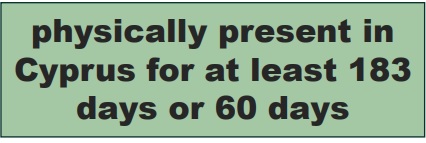INDIVIDUAL
Under the Income Tax Law, an individual is considered Cyprus tax resident if they are physically present in Cyprus for at least 183 days in the tax year (183-day rule), which runs from 1 January to 31 December.
In July 2017, the Cyprus House of Representatives voted to amend the Income Tax Law regarding the tax residence of individuals by introducing the 60-day rule, with effect from 1 January 2017.
The new provision means that the individual will also be deemed to be resident in Cyprus if:
- do not reside in any other single state for a period exceeding 183 days in aggregate, and are not tax resident in any other state, and
- reside in Cyprus for at least 60 days during the tax year (01/01/-31/12), and
- have other defined Cyprus ties. To satisfy this condition the individual must carry out any business in Cyprus and/or be employed in Cyprus and/or hold an office (director) of a company tax resident in Cyprus at any time in the tax year, provided that such is not terminated during the tax year. Further the individual must maintain in the tax year a permanent residential property in Cyprus which is either owned or rented by the individual.
- Further the individual must maintain in the tax year a permanent residential property in Cyprus which is either owned or rented by the individual (the residential property have to be always on his/her disposal).

For the purposes of both the 60-day rule and the 183-day rule, days spent in and out of Cyprus are calculated as follows:
- The day of departure from Cyprus counts as a day out of Cyprus
- The day of arrival in Cyprus counts as a day in Cyprus
- Arrival and departure from Cyprus on the same day counts as one day in Cyprus
- Departure and arrival in Cyprus on the same day counts as one day out of Cyprus.
An individual who is tax resident in the Republic of Cyprus (the Republic), is taxed on income accruing or arising from sources both within and outside the Republic.
An individual who is not tax resident in the Republic, is taxed on income accruing or arising only from sources within the Republic.
COMPANY
Under the Cypriot tax laws, a company is considered to be tax resident of Cyprus, if its management and control is exercised from Cyprus. As per Cyprus domestic law, the management and control exercised if:
- the majority of the Board of Directors meetings are taking place in Cyprus;
- the Board of Directors are exercise control and make key management and commercial decisions necessary for the company's operations and general policies in Cyprus;
- the Board of Directors' minutes are prepared and kept in Cyprus;
- the majority of the Board of Directors are tax residents in Cyprus;
INTERNATIONAL TAX
According to the Commentary of the OECD Model Tax Convention, a Company shall be deemed to be a resident only of the State in which its Place of Effective Management (POEM) is situated.
The place of effective management (POEM) is the place where key management and commercial decisions that are necessary for the conduct of the enterprise's business are in substance made.
The place of effective management will ordinarily be where the most senior person or group of persons (for example a board of directors) makes its decisions, the place where the actions to be taken by the enterprise as a whole are determined; however, no definitive rule can be given and all relevant facts and circumstances must be examined to determine the place of effective management.
An enterprise may have more than one place of management, but it can have only one place of effective management at any one time.
The content of this article is intended to provide a general guide to the subject matter. Specialist advice should be sought about your specific circumstances.
We operate a free-to-view policy, asking only that you register in order to read all of our content. Please login or register to view the rest of this article.


